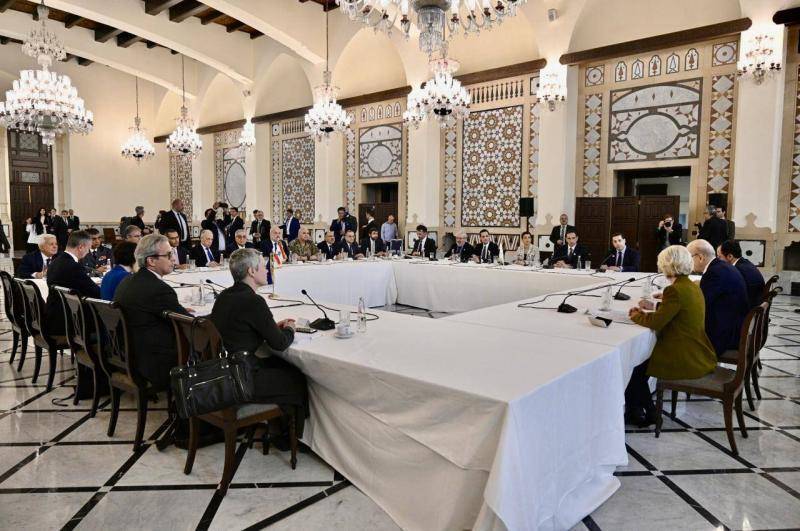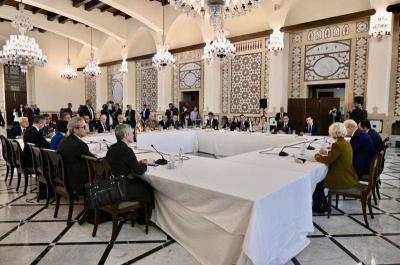What European Commission President Ursula von der Leyen announced yesterday from Beirut regarding a €1 billion aid to support the stability of Lebanon has sparked widespread debate about this move, which comes amid cooperation between authorities to combat the smuggling of Syrian refugees that has recently increased towards Cyprus. The controversy arises because Lebanon seeks a solution that will end the illegal presence of hundreds of thousands of these refugees, as their stay in Lebanon is considered illegal. Meanwhile, the European rhetoric does not directly address the urgent issue of displacement that is threatening the country.
The statement by caretaker Prime Minister Najib Mikati last night raised doubts about the new European stance, as he sarcastically commented on describing the €1 billion aid as a bribe, saying, "I wish." He added that in previous conferences concerning the European Union, it was stated that Syrian refugees should remain in Lebanon, and Lebanon could take whatever money it needs.
However, he also revealed that there is a division in the European position regarding the return of Syrian refugees to their country. He stated, "We requested the EU to acknowledge that there are safe areas in Syria, but there is a European division on the issue of safe areas."
Informed sources told "Nidaa Al-Watan" that alongside Lebanese pressure, international and European efforts have been activated after it became clear that the situation in Lebanon can no longer bear the strain. Therefore, there has been an increase in budget monitoring, which implies an attempt to entice the Lebanese. They further added that the focus is entirely on the fact that this money will be allocated for two purposes: either for the deportation of refugees from Lebanon or for their return to Syria. Relying on funds for their continued presence in Lebanon is considered a rejected bribe. It cannot pass, and it is prohibited to pass; otherwise, there will be a manipulative process due to the immense pressure that will intervene.
They concluded by stating that there is definitely an understanding externally that the political reality in Lebanon is heading towards explosion if this issue is not resolved.
The visit of the European official alongside Cypriot President Nikos Christodoulides to Beirut came at a time when Nicosia has recently returned boats of migrants that had set out irregularly from Lebanon, amid Beirut's reiteration of its request to the international community to repatriate Syrian refugees after battles ceased in several Syrian provinces.
Von der Leyen stated during a press conference following her meeting with President Mikati and the Cypriot president that she could announce a financial package of €1 billion for Lebanon, which will be available starting this year until 2027 to contribute to economic and social stability. She addressed the authorities, saying: "We rely on your good cooperation to prevent irregular migration and combat human smuggling," referring to the irregular migration boats departing from Lebanon's shores.
She affirmed the EU's determination to support the Lebanese army and security forces by providing equipment and training for border management. According to a spokesperson for the EU in Brussels, €736 million of the total amount will be allocated to support Lebanon in responding to the Syrian crisis and the Syrian refugee crisis and everything Lebanon has to deal with as a result of the Syrian crisis, while the remaining amount will be allocated within the framework of bilateral cooperation to support the army and security agencies.
Lebanon, which has been experiencing a severe economic crisis since 2019, hosts around 2 million Syrians, with less than 800,000 of them registered with the UN, making it the highest number of refugees in the world relative to its population. Many cross from Syria to Lebanon through smuggling routes hoping to board illegal migration boats, which have become a starting point in northern Lebanon. Migrants seek a better life in European countries, often heading to Cyprus, the Mediterranean island located less than 200 kilometers from Lebanon.
Cyprus claims it is witnessing an increasing flow of Syrian migrants from Lebanon irregularly, especially since the outbreak of the war between Israel and Hamas on October 7. It believes that the escalation at the border between Hezbollah and Israel has weakened Lebanon's efforts to monitor its territorial waters and prevent the departure of migrant boats. Since the beginning of the year until April 4, over forty boats carrying around 2,500 people have arrived in Cyprus, according to estimates from the United Nations High Commissioner for Refugees, which did not specify the number of boats that set sail from Lebanon and those that departed from Syria, according to "Nidaa Al-Watan."




